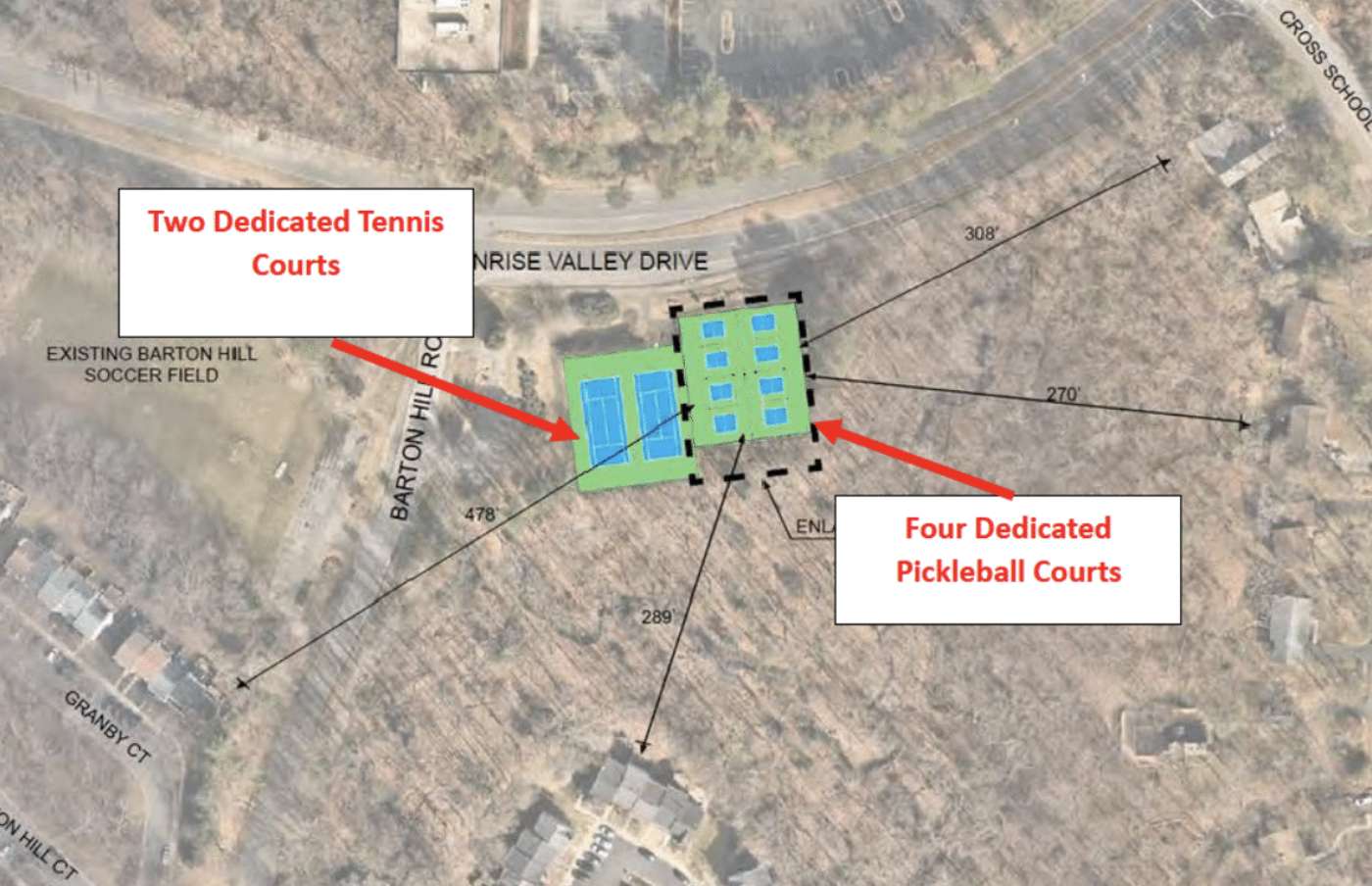
Reston Association’s Board of Directors deferred a decision last week on how to handle the planned addition of pickleball at Barton Hill’s tennis courts to Jan. 25.
The decision on Thursday (Dec. 14) comes as the organization grapples with community concerns about noise from the new courts and enthusiasm from pickleball players seeking more locations to play the burgeoning sport.
The association is choosing between two designs for the project: six dedicated pickleball courts with four courts that have blended lines on the existing tennis courts at 1901 Barton Hill Road or four dedicated pickleball courts with no blended lines on the existing courts.
RA plans to install Acoustifence — noise blocking material — to manage sound in the area, adding $75,000 to the initial price tag of $770,000.
With the assistance of consultant Kimley-Horn, RA completed two sound studies in July and November. The latest study found that noise from pickleball play is below Fairfax County’s noise ordinance for continuous sound — sound that is constant throughout observation — and 100 decibels for impulse sound — single or multiple sounds characterized by a sudden rise in noise.
“I’m not going to sit here and tell any neighbor that what they’re hearing is not valid or isn’t reality,” Aaron Heustess, a senior civil engineer with Kimley-Horn, said. “All I can do is point back to the data, which says if you look at the meter and you watch what’s happening, it’s not impacting the noise.”
According to Heustess, most of the studied sound was dominated by traffic noise.
Board director Laurie Dodd noted that the county’s noise ordinance is designed more for average noise levels, rather than impulse noise levels.
Heustess also pointed out that the sound produced from a pickleball whacking a racket is significantly shorter than other sounds and has “low energy from an overall average standpoint.”
“The impulsive nature of pickleball noise does not drive the average noise level for that particular use,” he said.
He also noted that the county’s noise ordinance has an exception for recreational uses between 7 a.m. and 7 p.m.
The bottom line, Heustess concurred with director Irwin Flashman, was to “keep it as far away from people as you possibly can.”
Meanwhile, RA’s community survey found that 15% of its members played pickleball within the last year, and 12% of members would’ve played in the last month but were limited by the availability of courts. Others said they were concerned about overcrowded courts and limited hours.
If approved, scheduling for the Barton Hill pickleball courts and the soccer field would be staggered to address concerns about parking needs. There are currently 28 existing parking spots at the courts, including ones across the road at the soccer field.
In a separate matter, RA worked with community members to draft a memo asking the Virginia Department of Transportation to consider installing a crosswalk on Barton Hill Road.
Further engineering and study is necessary before a permit application is submitted.
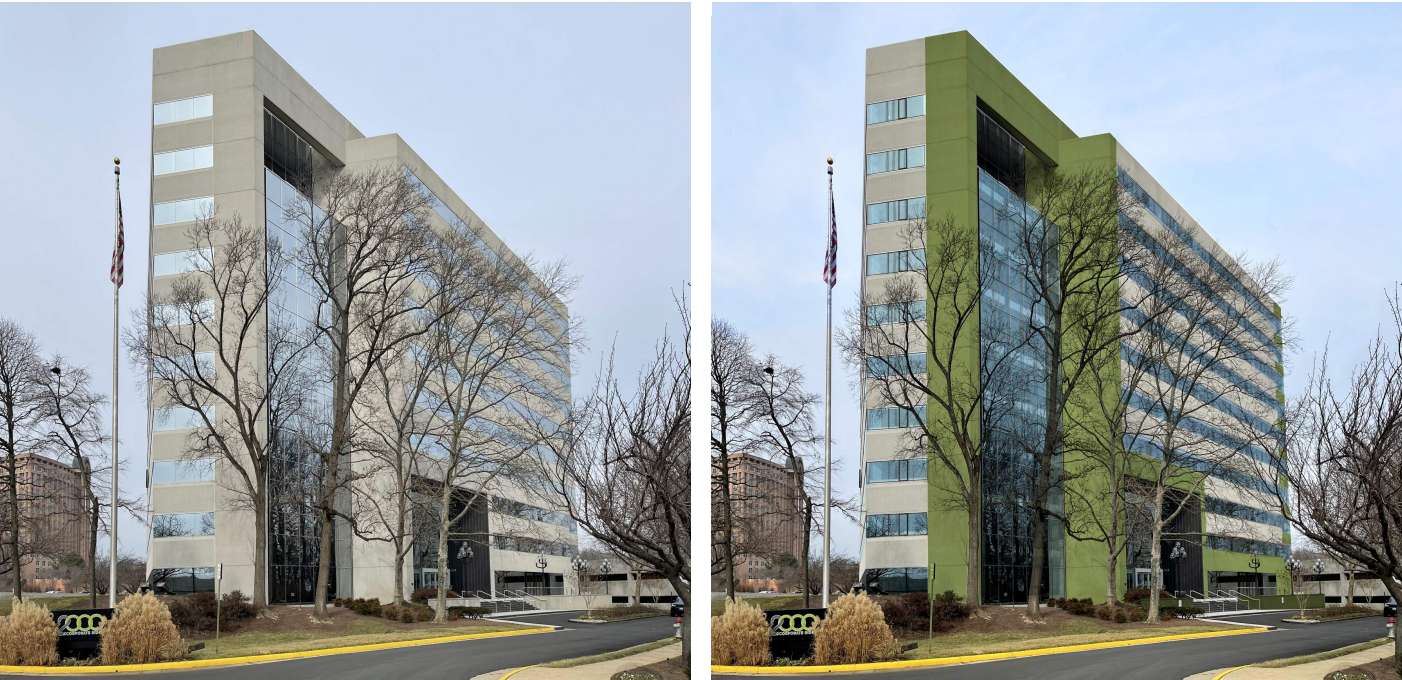
The Capital Beltway’s proximity to 2000 Corporate Ridge is both a boon and a potential obstacle to plans to convert the office building into a live/work development.
The accessibility of Tysons Corner Center and other attractions will make the property enticing to residents and workers, who can now cross I-495 with a pedestrian bridge, McGuireWoods land use lawyer Greg Riegle argued on developer Madison Highland’s behalf at a Fairfax County Planning Commission public hearing on Sept. 14.
However, county staff fear noise from the adjacent highway could deter those same residents and workers from utilizing the park and amenity spaces proposed to replace most of the 8-acre site’s surface parking.
The developer, going under the name McLean Corporate Ridge Property LLC, has committed to some mitigation measures, including window upgrades and evergreen tree plantings to separate the public park areas from an existing sound wall along the Beltway, according to a staff report.
“There still remains outdoor recreation and park space that is encumbered by noise impacts that exceed Policy Plan guidance,” staff said in the report. “Staff continues to recommend creative solutions, like artistic walls, to further mitigate noise impacts to better be in conformance with the Policy Plan or to increase the useability of the space of future residents should be further explored by the applicant.”
Despite those concerns, which Riegle noted could be further addressed at the more detailed site plan phase, county staff and the planning commission recommended that the Fairfax County Board of Supervisors approve Madison Highland’s rezoning application.
Following up on similar projects in Bailey’s Crossroads and Merrifield, the developer is seeking to convert the 10-story office building northeast of the Beltway and Route 7 (Leesburg Pike) into up to 250 live/work units, which can serve as housing, a workplace or both. Between 10 and 13% of the units will be designated as workforce dwelling units, in accordance with the county’s guidelines for Tysons.
Even after recent renovations, 2000 Corporate Ridge is struggling with vacancies in a slow office market, according to Riegle. Compared to a full replacement, the proposed conversion would be a more efficient and environmentally friendly way to put the building “to productive use,” while keeping the door open for future commercial uses, he told the planning commission.
“The building as it exists doesn’t contribute anything to the fabric or economy of Tysons, and there’s not a good way forward, absent repositioning here,” Riegle said. “The tactical repositioning is good for the site, it’s good for the community, and frankly, it’s good for the remaining office opportunities in Tysons.” Read More

In response to concerns about noise, Reston Association has scaled back plans for pickleball courts at Barton Hill.
At a Sept. 6 community meeting, staff said they reduced the number of pickleball courts planned for the facility at 1901 Barton Hill Road from six to four and removed blended lines between tennis courts that allowed both tennis and pickleball uses.
The move was in response to concerns about increased noise from the pickleball facilities, according to Chris Schumaker, RA’s capital projects director.
RA conducted two types of noise studies on June 1 — one for continuous noise and one for instantaneous noise. In both cases, RA found that the average noise levels — measured in weighted decibels (dBAs) — were below the limits enforced by Fairfax County’s noise ordinance.
The average for continuous noise was 54 dBA, and the average for instantaneous or impulse noise was 57 dBA.
Staff also plan to install a sound attenuation product called Acoustiblok, a technology that could reduce decibels by 25 and 30 units.
“We feel pretty confident that we can mitigate the noise at Barton Hill,” RA Chief Operating Officer Peter Lusk said.
According to Schumaker, RA has submitted a request for the Virginia Department of Transportation to install a crosswalk over Barton Hill Road at the Sunrise Valley Drive intersection to address safety concerns.
The request was bolstered by a May 20 traffic study that found a high number of pedestrians using the crosswalk.
Staff also said that pickleball and soccer events could be staggered to limit impacts on the street.
RA’s Board of Directors will consider the project at its Sept. 28 meeting. The project will then go to the Design Review Board for review and approval, likely in November.
A contractor would be selected in February or March, depending on the board’s input. The contract will then head to the board for final approval after that point.
At the meeting, residents’ feedback fell on both sides of the fence. As pickleball has grown in popularity, concerns about the noisiness of the sport have mounted nationwide.
Laura David, who serves on the board of Reston’s Harpers Square Cluster, noted that the noise study took the average noise level from the center court and not from the boundary. She said that neighboring residents remain concerned about high levels of noise from the whacking of pickleballs.
“Sound still continues to be a major concern,” David said.
Others said RA should continue to support pickleball and asked for the original number of planned pickleball courts to be restored.
“There’s a shortage of [facilities]. There’s a real shortage,” said Reston resident Carol Dickey.
Some questioned if it made sense for RA to invest money in the project if it yielded only four pickleball courts.
“You’re talking like it’s something bad. It’s not,” said Carol Shepherd, a Reston resident of 46 years and a pickleball player.
Photo via Joan Azeka/Unsplash
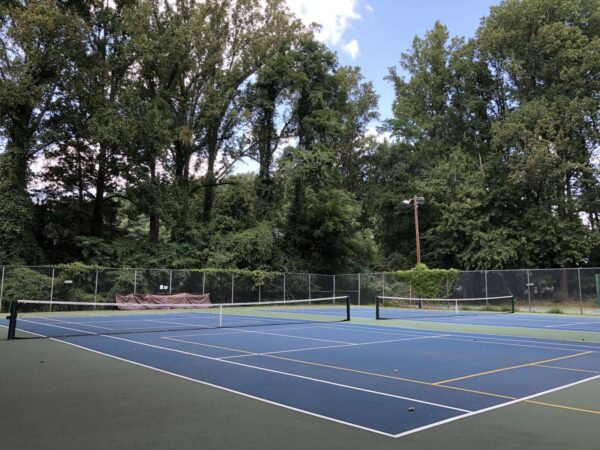
As frustrations persist over the pickleball courts at Glyndon Park, the Vienna Town Council has resorted to appealing to Fairfax County for assistance.
The council voted on June 19 to send the Fairfax County Board of Supervisors a letter asking them to identify potential sites for pickleball near the town, whose only existing facilities — the four courts at Glyndon — have been plagued by noise complaints from neighbors.
“We are asking you to help Fairfax County residents have more options of locations to play pickleball with longer hours,” Mayor Linda Colbert and the town council said in the draft letter. “The county owns facilities near the town that could be used for pickleball. Because of their relative distance from residential neighborhoods, several of those facilities are far better suited to use for pickleball than Town of Vienna owned property.”
Earlier this year, the town reduced the hours when pickleball was permitted at Glyndon Park (300 Glyndon Street) in an effort to alleviate tensions between neighboring residents and local players.
Under the new policy, set open play hours were eliminated, and a reservation system was implemented for players who live in Vienna. The town is also encouraging players to use quieter paddles.
Since the policy took effect on March 1, the Vienna Police Department has received 18 noise complaints about pickleball being played outside the designated hours, Vienna Parks and Recreation Director Leslie Herman reported at a June 5 town council meeting.
Seven of those complaints were determined to be unfounded, and 10 resulted in police issuing a warning. At least four complaints have been made to police since that meeting, according to the VPD’s weekly recaps.
Despite those complaints, residents told town staff that the situation has been more tolerable this spring, and most regular court users seem to be abiding by the rules. The ongoing issues appear to stem from non-regular users who “either ignore the posted rules or do not know the rules,” Herman said.
“The residents feel that the limited number of people due to no open play is a big factor that is helping them tolerate pickleball play,” Herman said. “There is a concern that allowing open play will generate additional noise as the number of players will increase. The issue is not from the ball, but from the amount of people congregating.”
Based on 48 random visits to the park, town staff observed up to 18 people on the courts at one time, but that could increase if open play was encouraged, particularly with the warmer summer weather bringing more people outside, according to Herman.
The Vienna Pickleball Club had requested a return of designated open play hours when anyone can show up and use the courts, reporting some confusion around the reservation system and concerns that newer players are being left out.
From March 1 through May 20, the courts were reserved approximately 37% of the available pickleball times, Herman reported. Read More
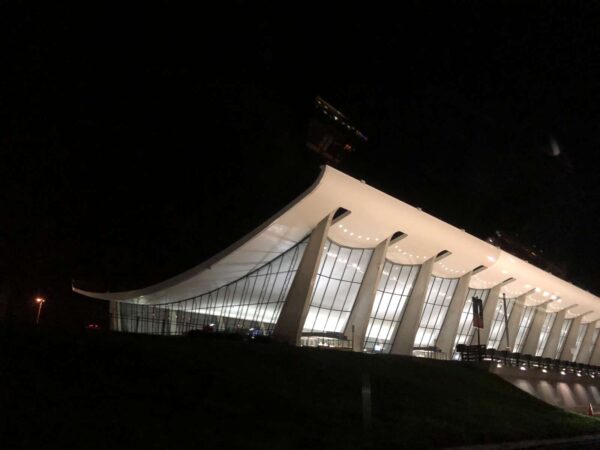
More local legislators are pushing back against a federal proposal to allow more long-distance flights at National Airport (DCA).
The Fairfax County Board of Supervisors voted unanimously yesterday (Tuesday) to oppose the push to increase the number of flights that travel beyond 1,250 miles from the airport in Arlington.
In a letter to the U.S. Senate Committee on Commerce, Science & Transportation, the board argued that the effort would undermine Dulles International Airport (IAD), resulting in “detrimental” impacts on the local economy.
The legislation pushed by the Capital Access Alliance, a coalition of business groups, continues a long-running battle over slot and perimeter rules originally enacted in the 1960s.
The board argues that changes would disrupt the balance between the region’s two major airports and compromise the operating environment for air traffic. The letter also says flight paths for arrivals and departures to the south of DCA have caused major noise issues over residential areas in the county following the implementation of a federal Next Generation Air Transportation System, also known as NextGen.
Board Chairman Jeff McKay emphasized that the issue resolves around public safety. He said that many airline pilots that fly out of DCA say that is one of the “most dangerous” airports to fly in and out of because its designed for specifically-sized airports in the landing area.
“This is not just wrong to impose these changes without a lot of public input, it’s not just wrong for parochial reasons, but it’s wrong to do it in the name of public safety as well, and I think that’s one of the things that’s important for us to emphasize,” McKay said.
Proposing to allow 28 more long-distance flights out of DCA, the bill was introduced on May 10 by Reps. Burgess Owens and Hank Johnson, who represent Utah and Georgia, respectively. It has already faced opposition from Virginia’s senators, a community group looking at the airport’s noise issues, and the Metropolitan Washington Airports Authority, which manages both DCA and IAD.
Congress is expected to consider the proposal this fall.
Mount Vernon District Supervisor Dan Storck and Mason District Supervisor Penny Gross said the issue of airport noise is particularly problematic.
“Mason District is not on a direct path of the airplanes for National, but we are getting increasing numbers of complaints about airplane noise and helicopter noise. So, I’m glad that we’re stepping up and doing this,” Gross said.
Storck said he hopes other efforts can be undertaken to tackle airplane noise, especially in his district. He noted that County Executive Bryan Hill is working with Alexandria and Arlington officials to enlist a consultant that will study ways to mitigate noise impacts.
The county says that maintaining existing perimeter and slot rules is necessary in order to spur growth at Dulles, which is supported by the arrival of Metro’s $6 billion Silver Line extension.
“The interconnectedness of Virgnia’s and the mid-Atlantic’s aviation system makes the continued success of both airports vital to both the Commonwealth of Virginia and the Washington Metropolitan Region,” the letter states. “As such, we request your support in preventing further efforts to modify the perimeter and slot rules to protect the balance between the capacities of our region’s airports.”

Getting court time at Glyndon Park in Vienna may be tougher going forward for pickleball players.
In the hopes of alleviating noise complaints from nearby residents, the Vienna Town Council approved a significant reduction in playing time for the increasingly popular sport at the 11-acre park’s four courts during its Monday (Jan. 23) meeting.
However, the new schedule represents less of a reduction in days than initially proposed, allowing pickleball on four days per week instead of just three. It also eliminates shared playing times between tennis and pickleball, so hours designated for pickleball will be exclusively reserved for that sport.
“I see this as a long-term issue,” said Councilmember Chuck Anderson, who proposed the adopted schedule. “I think we all on council agree on that, that what we need to do is roll up our sleeves and take a look at capacity. This is a rapidly growing game. It’s very popular, but it also has a noise issue, and it’s something I think we need to work on and manage.
Pickleball is now limited at the park to the following hours:
Dec. 1 to the end of February
- 10 a.m. to 5 p.m. on Monday, Wednesday and Friday
- 10 a.m. to 1 p.m. on Saturday
March 1 through Nov. 30
- 9 a.m. to 7 p.m. Monday, Wednesday and Friday
- 9 a.m. to 1 p.m. Saturday
Outside of those hours, only tennis will be allowed. The courts close at 10 p.m.
As part of the approved motion, the council also directed the Department of Parks and Recreation to post signage at the park recommending that pickleball players use “quiet” paddles that supposedly make less noise.
Prior to Monday’s 5-2 vote, pickleball and tennis were both permitted at Glyndon Park (300 Glyndon Street NE) seven days a week, but they alternated during open-play hours on Monday through Thursday mornings — a schedule confusing enough that the town council spent several minutes of a Jan. 23 conference session on the proposed changes trying to get clarification.
Anderson said he had considered continuing some shared usage of the courts as part of his proposal but ultimately decided it would be too complicated. He also found that the suggestion didn’t appeal to either pickleball players or the residents who raised the noise issues.
“If you start sharing [on pickleball days], you have to do it the other way too,” he said. “On a tennis day, if the tennis courts aren’t being used and a pickleball player shows up, it would be used, and I just don’t think that’s workable.”
Since Vienna added pickleball lines to Glyndon Park’s two tennis courts in 2020, some residents have complained that the noise made by paddles hitting the plastic balls is “unbearable,” an issue that has cropped up across the country.
Town staff reduced open-play hours and introduced a reservation system for afternoons, but complaints persisted, with some residents calling for pickleball to be banned from the park altogether, Parks and Rec Director Leslie Herman told the council.
After talking with staff, the residents agreed limiting pickleball to Mondays, Wednesdays and Saturdays would be acceptable, leading Mayor Linda Colbert and Councilmember Ed Somers to object to the addition of a fourth day.
“I’m just concerned about adding a fourth day at this point. I might get there eventually if more people use the soft paddles, if the noise is reduced, if things change, I could get there very easily, but I’m not there right now,” Somers said to a smattering of claps from the audience.
Anderson and other supporters of the four-day schedule said it would give players more flexibility, while starting play later and ending it earlier.
“There’s just a one-hour difference, and it gives people more peace in the mornings and evenings,” Councilmember Nisha Patel noted.
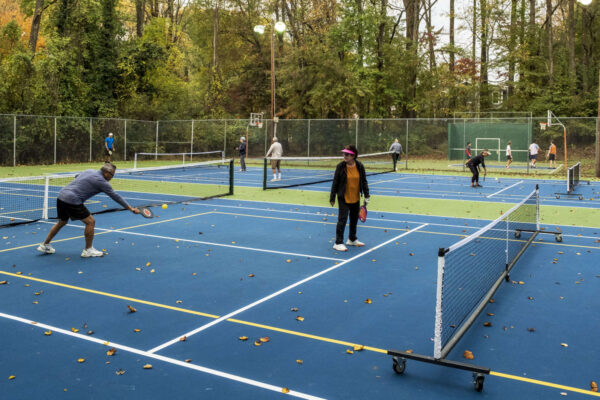
The nationwide face-off between pickleball enthusiasts and homeowners has arrived in the Town of Vienna.
In the hopes of quieting resident noise complaints, the town council is set to vote on Monday (Jan. 30) to reduce pickleball play to three days per week at the courts in Glyndon Park (300 Glyndon Street NE).
Currently available seven days a week, the four pickleball courts would open Mondays, Wednesdays and Saturdays under the proposal from the Vienna Parks and Recreation Department. The hours of 8 a.m. to 8 p.m. on Mondays and Wednesdays would remain the same, but on Saturdays, they would end at 5 p.m.
Town staff recommended an 8 a.m. start time for Saturday, but at a conference session on Jan. 23 that saw some tense back-and-forth exchanges on both the dais and from the audience, a few council members suggested considering 9 a.m. instead, since kids might want to sleep in on the weekend.
“I don’t know that anybody is a hundred percent thrilled with this, but it is in my mind a compromise, and it’s something we can do right now,” Mayor Linda Colbert said.
Glyndon Park’s pickleball courts were welcomed with gusto by local players — including the mayor, who also partakes in tennis — when they opened in October 2020. With aid from the Vienna Pickleball Club, which paid for some of the equipment, the town added pickleball markings to the two existing tennis courts as part of a planned refurbishment.
However, players have run afoul of some nearby residents, who describe the sound of paddles hitting the plastic balls as “unbearable, loud and constant,” according to one comment in an October survey conducted by the parks department.
“The noise is unbearable,” wrote a resident of Jean Place NE, which is across the street from the courts. “The constant popping 12 hours a day 7 days a week is borderline torture. We cannot use our outdoor space anymore due to pickleball and cannot open our windows.”
The survey went to 34 households and received 17 responses, including seven from people who reported having no issues with pickleball. Parking and traffic complaints also came up, but Parks Director Leslie Herman said those “have been taken care of” with signage directing players to an overflow parking lot by the baseball diamonds.
Vienna isn’t alone in seeing clashes between homeowners and pickleball players. As the sport has grown in popularity over the past decade, so have the noise complaints, leading some communities to close courts and others to be taken to court — including in nearby Arlington County.
The sound level for pickleball is anywhere from 57 to 79 decibels, depending on proximity and the type of equipment used. That’s 25 decibels higher than a tennis racket hitting a ball, according to the Los Angeles Times.
People talking can also contribute to the noise levels, Councilmember Ray Brill said, recalling a visit to Glyndon Park where he saw dozens of people at the courts who weren’t playing.
“I love exercising, and I love playing sports outdoors, but we have neighbors we have to be considerate of,” Brill said. “There’s no shortcuts, so we have to compromise. We have to allow people to play, but they have to take steps to reduce the noise.” Read More
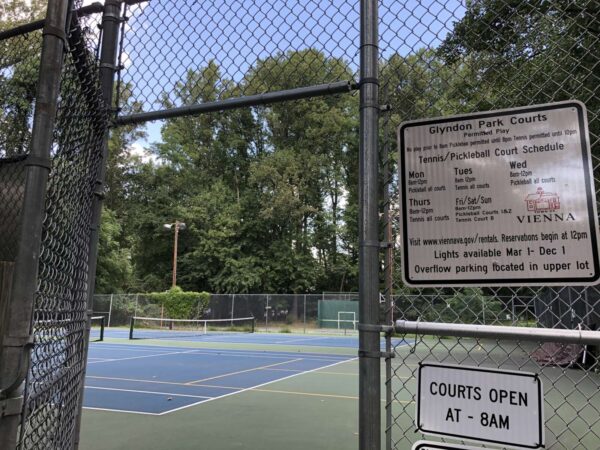
Pickleball has evidently become a hot nighttime activity in the Town of Vienna.
Vienna police have issued six noise violations this year for players hitting the courts at Glyndon Park (300 Glyndon Street) after hours, according to the department.
The most recent issues were reported on Aug. 20 and 24, per the Vienna Police Department’s crime highlights for the week of Aug. 19-25:
Noise Violation 22-008587
Glyndon Park
300 Glyndon Street, NE
August 20 9:39 p.m.
A resident reported that people were playing pickleball on the tennis courts. The officer advised the people playing pickleball of the Park regulation.Noise Violation 22-008719
Glyndon Park
300 Glyndon Street, NE
August 24 8:07 p.m.
A resident reported that people were playing pickleball on the tennis courts. The officer advised the people playing pickleball of the Park regulation that only tennis may be played on the courts after 8:00 p.m.
However, police also responded to noise complaints on Aug. 3 as well as Aug. 7 and 8, according to previous reports.
Four of the six violations involved different people, while two occasions involved the same participants, VPD spokesperson Juan Vazquez told FFXnow.
Glyndon Park’s two tennis courts were renovated so they could also be used as four pickleball courts in fall 2020. However, the park’s rules cut off pickleball play at 8 p.m., whereas tennis can continue until 10 p.m.
Noise has become a source of aggravation for some Vienna residents, whether from construction or outdoor dining, prompting the town council to agree in July to review the noise ordinance for the first time in a decade.
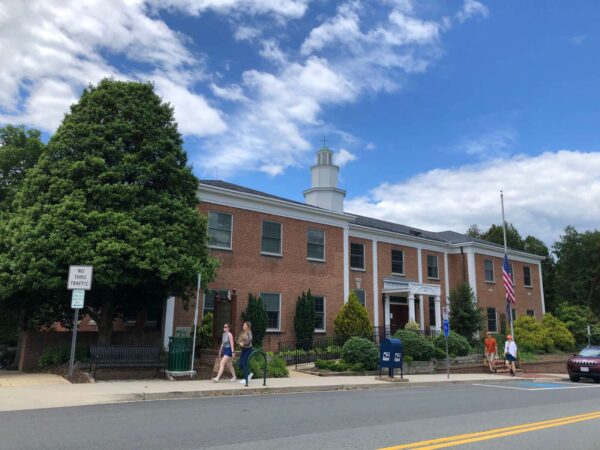
At the urging of some residents and even a Fairfax County School Board member, Vienna is revisiting its noise rules, especially for businesses and other commercial sites.
The town last rewrote its noise ordinance came in 2011, but with sound issues becoming a growing source of tension between residents and businesses, the Vienna Town Council agreed on Monday (July 11) to initiate a new review — with no guarantee that anything will change.
Instead, the council directed staff to research best practices and regulations from other localities to determine whether the town should pursue any updates.
“We are not even at a point that we are suggesting there’s changes,” Mayor Linda Colbert said. “So, we may look at other jurisdictions and decide we like our noise ordinance the way it is…A conference session to review what the [police] chief and town attorney have come up with makes sense.”
Commercial Truck Noises Frustrate Residents
While possibly compounded by increased construction activities and pandemic-related changes, such as more people working from home, noise complaints aren’t a new trend for the Town of Vienna.
A resident of Park Street NE since 2019 told FFXnow that one of his neighbors has spent 20 years battling issues from Mill Street, a commercial strip that backs up to their houses. One business, the now-defunct Bey Lounge, had a live entertainment permit revoked in 2019 after multiple noise ordinance violations stretching back to 2016.
The resident, who asked not to be named out of fear that Vienna’s “small-town politics” could put “a scarlet letter on my name,” says he hears trucks pulling up to the Mill Street businesses every morning, sometimes as early as 3 or 4 a.m.
While he describes himself as a heavy sleeper, his kids reliably wake up whenever the noises begin, and he believes an inability to get a full eight hours of sleep contributed to developmental challenges his son started experiencing in early 2020, before COVID-19 arrived in the U.S.
Since he brought up his concerns to the town council in August 2021, the resident says the Vienna Police Department has done “a fantastic job” enforcing the existing noise rules, but commercial vehicle loading and unloading is allowed within 300 feet of a residence on weekdays except from 11 p.m. and 6 a.m. — a seven-hour stretch. Read More
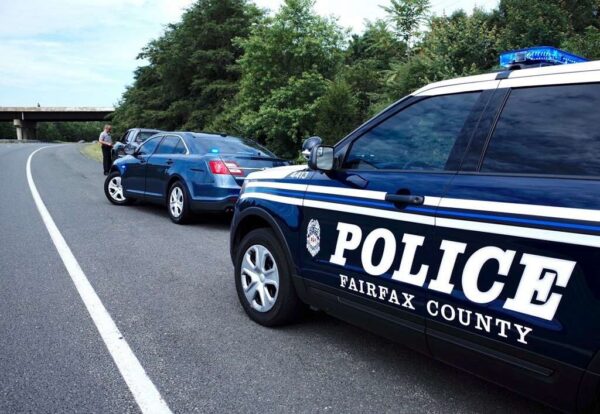
A change in Virginia law will allow police to once again pull over vehicles with excessively loud exhaust systems, starting tomorrow (Friday).
At a Fairfax County Board of Supervisors meeting on Tuesday (June 28), officials said the change was much needed, citing noisy cars as one of the top complaints they receive from constituents.
“This is a very annoying issue to a high percentage of my district’s residents,” Mount Vernon District Supervisor Dan Storck said. “I probably hear about this more than anything else.”
Earlier this year, the Virginia General Assembly passed legislation authorizing police to pull over vehicles and issue violations for loud exhaust systems.
Virginia eased rules on exhaust noise levels after the General Assembly passed legislation sponsored by local lawmaker Del. Patrick Hope (D-47) in 2020. Hope and other advocates argued at the time that police were disproportionately pulling over drivers of color for minor infractions, like broken tail lights, tinted windows, and loud exhaust systems.
That law went into effect in March 2021.
However, the change seemed to lead to a rise in noise complaints related to loud exhaust systems in Fairfax County and neighboring jurisdictions.
So, a new bill was created, passed, and signed into law by the governor this year that specifically made exhaust systems “not in good working order and in constant operation to prevent excessive or unusual levels of noise” a primary offense, meaning police can now pull over drivers specifically for that.
Braddock District Supervisor Walkinshaw and Springfield District Supervisor Herrity said they often hear from residents about loud vehicle exhausts. Hunter Mill District Supervisor Walter Alcorn said expensive, new exhaust systems with the express purpose of making noise are popular among some in his district.
Even Hope, the sponsor of the original bill, admitted to FFXnow that the 2020 bill had “unintendend consequences,” though he did vote against this session’s legislation.
“This [legislation] was in response to the unintended consequence in the 2021 law of some motorists taking advantage of the law change and installing obnoxiously loud exhaust systems on their vehicles, disturbing families and neighbors,” he wrote. “I heard many complaints from constituents that supported the intent of the law but the unintended consequence was a disturbance of the peace.” Read More

